The Irving Wallace School Of Writing
The ultimate compliment you can give a writer is to want to live the life of his characters. Romance writers may not have much trouble accomplishing said feat. For other genres, it's very, very difficult to come up one, let alone more than one book where the reader starts thinking about being in the characters' shoes. One such author, who consistently bottles lightning, is Irving Wallace. The Prize, By Irving Wallace : The hero, writer Andrew Craig, a flawed character, who is fighting innner demons caused by the death of his wife. Drowning in booze, he wins the Nobel prize, and the entire book weaves his personal struggles and those of the other nobel laurates with the machinations of the Nobel foundation. Overflowing with anectodes and facts about the workings of the Nobel foundation and the history of the prize, this book represents Irving Wallace at his best. Sadly, the only copy of the book I had was missing it's last few pages, so I never found the end. Which may be why I still remember every small detail about the book. The Swedish writer Gunnar Gottling, the wise old Count Jacobsson, the blonde Lilly Hedquist and even the place of her employment - Nordiska Kompaniet.
The Prize, By Irving Wallace : The hero, writer Andrew Craig, a flawed character, who is fighting innner demons caused by the death of his wife. Drowning in booze, he wins the Nobel prize, and the entire book weaves his personal struggles and those of the other nobel laurates with the machinations of the Nobel foundation. Overflowing with anectodes and facts about the workings of the Nobel foundation and the history of the prize, this book represents Irving Wallace at his best. Sadly, the only copy of the book I had was missing it's last few pages, so I never found the end. Which may be why I still remember every small detail about the book. The Swedish writer Gunnar Gottling, the wise old Count Jacobsson, the blonde Lilly Hedquist and even the place of her employment - Nordiska Kompaniet.
 The Hotel, by Aurthur Hailey : The story revolves around a hotel in New Orleans, The St. Gregory, again featuring a flawed hero, Peter McDermott, who is trying to banish the memory of a past mistake and redeem his career. Again, the entire book has expansive details about the inner workings of a hotel woven skillfully around the life of the characters. The high pressure work environment of the cooks, the use of brass or copper for frying pans, the inter-racial overtones and tensions in New Orleans, all push the reader, ever so gently, into the daily world of a hotel and its employees. Great research, great characters and a great yarn, all said and done.
The Hotel, by Aurthur Hailey : The story revolves around a hotel in New Orleans, The St. Gregory, again featuring a flawed hero, Peter McDermott, who is trying to banish the memory of a past mistake and redeem his career. Again, the entire book has expansive details about the inner workings of a hotel woven skillfully around the life of the characters. The high pressure work environment of the cooks, the use of brass or copper for frying pans, the inter-racial overtones and tensions in New Orleans, all push the reader, ever so gently, into the daily world of a hotel and its employees. Great research, great characters and a great yarn, all said and done.
What are the common strands in these two best-sellers? A flawed hero, who starts off hiding or running from his past. Authetic and in-depth research into the entire profession of the protagonists. A challenge and a wrenching change in the life of the hero, followed by the fleshing out of the other characters. Ending in the redemption of the hero. One important thing to note is that while there are sad and twisted characters in both books, there is no villian. It is just the hero fighting against circumstance and for the betterment of his own life. Much closer to reality and something which readers can emphatize with. That is the Irving Wallace school of thought.

No comments:
Post a Comment